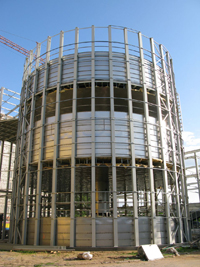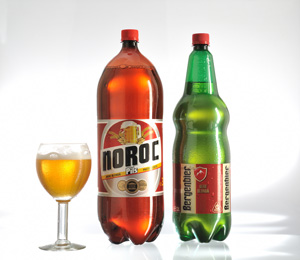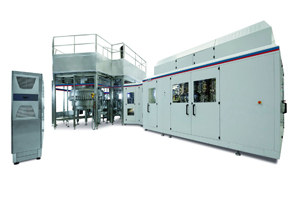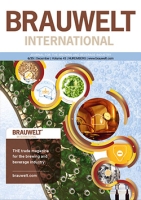Krones has developed a new cellar concept that design-enhances the field-proven double-seat valve technology with a decentralised approach to fully automated cellar systems. The new TwinPro cellar concept is based on double-seat valves, grouped together in filling and draining racks. Several tanks can be linked to the filling and draining valve racks in what are called tank loops. The number of tanks per loop is chosen to meet the specific requirements of the client concerned.
The company Teutoburger Christinenbrunnen GmbH & Co. in Bielefeld has realized and implemented new options in the area of the filling hygiene in a short term. In June 2008 a filling line in the plant Bielefeld was upgraded, so that during the running production the required hygiene status is kept during the whole filling time. With this technology beverages can be filled in their native form without adding any preservative
Medella Light is the main brand produced by the only brewery in Puerto Rico: Cervecería India. Cervecería is considered one of the most up-to-the-minute breweries in Latin America operating under the American flag. It was recently modernized on a huge scale, with new buildings, a new brewhouse, and new plant equipment. Craig Hylwa, Operations Team Leader at Cervecería India, set high quality standards: As regards the new investment in filling and packaging technology he went for KHS technology in the fields of canning, glass bottling and keg filling systems.
GlobalMalt, one of the world’s leading malting groups based in Germany, will complete the extension of its malthouse GlobalMalt Polska in Bydgoszcz/Poland within the fourth quarter of 2009. Thus the yearly production capacity of this site will be doubled to become 85,000 tons.
The Ziemann Group announces a further major development at the drinktec 2009 fair: After acquiring a majority holding in the company BMS Maschinenfabrik, a German manufacturer of packaging and palletising plants, Ziemann has now entered a joint venture with the company Nanjing Light Industrial Machinery Corporation (NLM). The state-owned enterprise NLM is China’s largest manufacturer of filling and packaging plants.
Larry Smith, President and CEO of Thiele Technologies, a leading manufacturer of high-speed integrated packaging equipment solutions headquartered in Minneapolis, Minnesota, has announced the acquisition of Hudson-Sharp Machinery Company of Green Bay, Wisconsin, and Brussels, Belgium, a world leader in the design and manufacture of plastic bag machinery, pouch making equipment and re-closable packaging solutions.
Since April 2009, the 5,000th blow molder sold by Sidel has been making PET beer bottles at one of the leaders on the world beer market, Anheuser-Busch InBev. With 5,000 blow molders installed since the 1980s, or about one-half of total machines worldwide, Sidel has beaten all the records.
With this in mind, KHS has now developed InnoPET BloFill, a monoblocked stretch blow molder/filler/capper system that has a whole host of advantages. Using an InnoPET BloFill setup as opposed to traditional PET bottle manufacturing and processing equipment incurs lower costs for investment and production. There are also the added benefits of increased line efficiency, minimized space requirements, and lower operator involvement. Another innovation that speaks for the InnoPET BloFill system is the ability to only half load the stretch blow molder even within the monoblock concept. This enables even more flexible coordination of the various components in the monoblock. Another important plus point is that the half-load option can also lead to a marked decrease in investment costs.
The experience of maintaining and repairing several hundred thousand fittings and kegs from diverse breweries and a number of different countries, that is, Belgium, Austria, Switzerland and Germany, provided the basis for this report. The data collected from keg maintenance and repair are described and evaluated in detail below.
The business unit beverage at the Huber Packaging Group is following new paths and is





